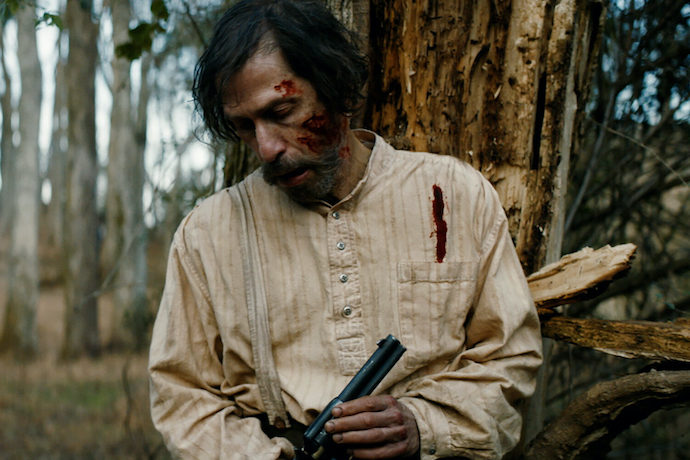‘Old Henry’ Upends the Western Genre
When asked to explain the appeal, many fans of Western movies note how the clear division of good and bad, and right and wrong, allows for easy identification of those to root for, or even admire. Writer-director Potsy Ponciroli muddies the water in Old Henry, blurring the lines between good guys and bad guys, and keeping us guessing until the end.
The film opens in the Oklahoma Territory in 1906, a mere seventeen years after the Land Rush of 1889. The farmer we meet, Henry McCarty (a perfectly chosen name) may or may not have been a ‘sooner,’ but he admits to his son that the idea of free land is what drove him to settle here, on the plot next to his deceased wife’s brother Al (Trace Adkins). Tim Blake Nelson is superb in the role, and plays Henry as a man with deep, and likely dark secrets. The land is challenging to work and he expends energy farming as well as protecting his son Wyatt (Gavin Lewis), a typical whiny teenager with little regard for adult struggles. Wyatt is anxious to escape the structure and limitations of life with dad.

Breaking a long string of days where nothing much happens for Henry and Wyatt, a gunshot-wounded man with a satchel full of cash is discovered on their land. Henry patches up the wound, and puts the unconscious man in bed, albeit with ropes binding him to the frame – one of the glimpses of Henry cluing us to waters that run much deeper than we’d typically expect for a farmer in the middle of nowhere. When the man awakens, he claims to be Sheriff Curry (Scott Haze) and that the three men chasing him are the bad guys. The dilemma for Henry is heightened in that he’s not an inherently trusting fellow, and the Sheriff badge is actually on one the vest of those three men, Ketchum (a fun turn from Stephen Dorff).
The verbal exchanges between Henry and Ketchum are oratory poetry, and it makes for a juicy and tension-packed chain of events. We are left to deduce which of the men – Henry, Curry, and Ketchum – are who they say they are. It’s a game of Clue featuring rifles, holsters, and horses. Cinematographer John Matysiak does a nice job with a wide range of shots: outdoors, in the cabin, the big shootout, and even a doorway shot as a tribute to John Ford.
The two twists are what really made this click for me. And one of them is quite a whopper. The suspense generated by the situation is certainly enhanced by the fancy verbal sparring, including a terrific line from Henry when asked about his background: “Many vocations, some more marginal than others.” But it really comes down to us as viewers, along with Henry, attempting to discern the good guys from the bad, and constantly asking ourselves…who do we trust? Mysteries are fun, especially when a good old-fashioned shootout is included, and the film’s big reveal turns out to be etched in Western lore.
